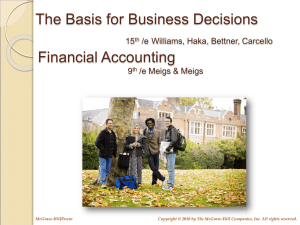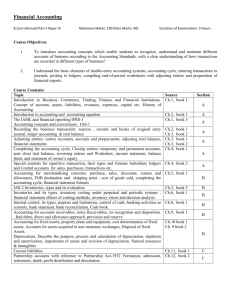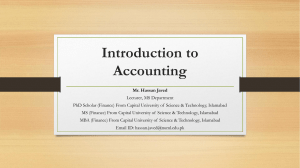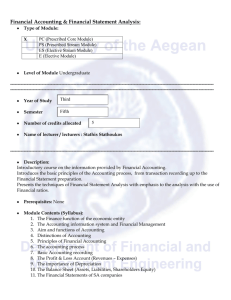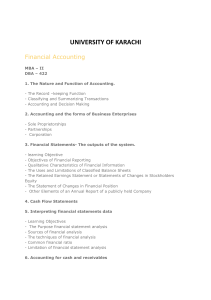Advanced Technology Course Needs Assessment - Meigs Middle School
advertisement
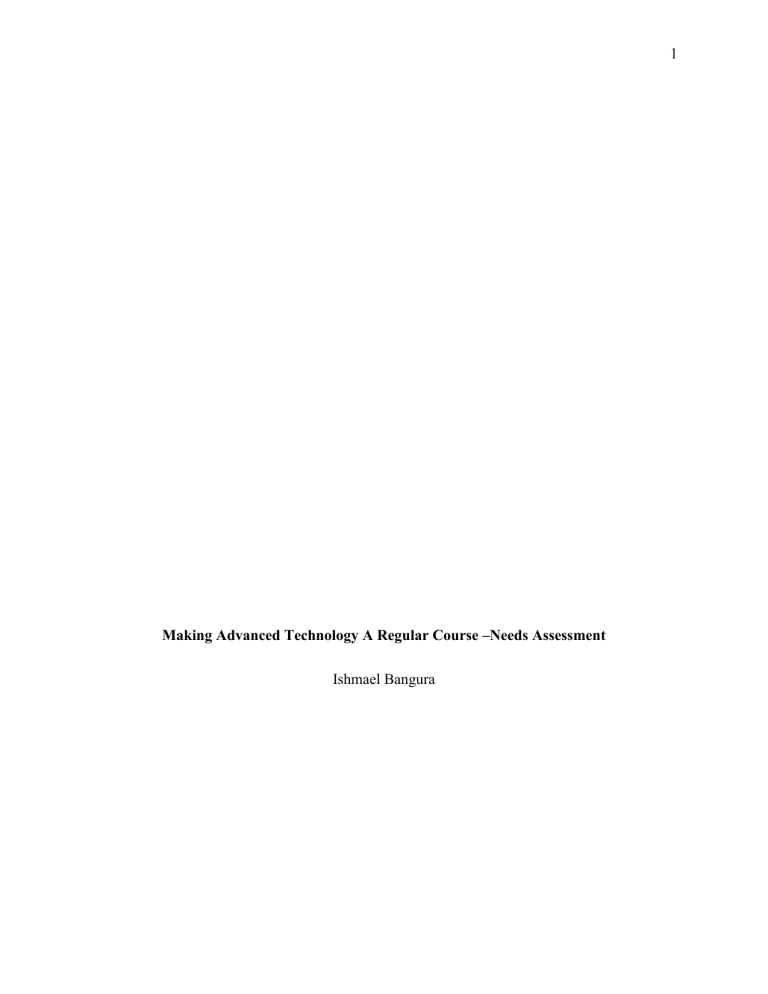
1 Making Advanced Technology A Regular Course –Needs Assessment Ishmael Bangura 2 I. Background Information A. Community Profile 1. Location of school Meigs Middle School was initially located in a Conference weapon factory before it was later shifted to Nashville, TN, a bigger city. When it was completed in 1883, the facility became Nashville's first school for African Americans since the Civil War (Rousseau, 2020). In 1888, the school became the first in Nashville to graduate an all-black senior class. The old structure was damaged by a storm and relocated to its present position on Ramsey Street after a lengthy restoration process. A magnet school in Nashville, Meigs School, opened its doors as one of the city's first. Ramsey Street School was demolished and rebuilt to accommodate the school's rising student body. Middle school students may walk to East Nashville Magnet High School, the closest high school. A middle school called Kipp Academy Nashville is the closest one to me. The closest elementary school is Warner Elementary School. 2. U.S. and local Census data with population and median income info for the Community The Nashville Metropolitan area, also called the Nashville-Davidson-MurfreesboroFranklin metro region, comprises various statistics that denote the population demographics of various centers in Nashville, the capital of Tennessee, United States of America (Gilhooly, 2018). The current population is estimated to be nearly two million, thus often regarded as among the most populated areas in Tennessee. The area is ranked 36th in terms of the largest metropolitan areas in the USA. By 1956, when the place was initially in its humble beginnings, the statistics express that it had only one county, Davidson County. However, through the increment of the population, the area has grown so fast that currently, it has 12 counties. When looking at the year's 3 population, it is quite evident that there is an increment in each year from 2010 to 2022. This indicates that the place still appreciates population, development, and economics. The interaction rate also increases, bringing a dynamic centre where people from different races and classes can come to get a suitable environment for their main objectives. The Nashville-Davidson-Murfreesboro-Franklin metro region in the United States will have around 1.96 people by 2020. Compared to the other previous year, there was a slight increase at 1.93 million people (Coulson, McCoy, & McDonough 2020). There are around 320 people per square mile concerning the population density, showing that the place is densely populated. Nashville's annual median household income is $25,045. Each year, the typical American earns $28,555. Nashville's income and wages in 2022, Nashville's metro population is 1,294,000, an increase of 1.73 percent over the previous year. In 2021, Nashville had a population of 1,272,000, growing 1.84 percent from 2020. As of 2020, the population of Nashville's metropolitan area was estimated at 1,249,000, a rise of 2.04% from the year before. The place is mainly occupied by more employed people who work in various assigned areas to make a living. Others own their business as well. Therefore, it is easier to witness the place keeps increasing economic state of the United States of America (Rousseau, 2020). The dependency rate is very low, and each year, the dependency level keeps on depreciating, making the essence of the metropolitan area proliferate unlike before. B. School Profile 1. School Background Information Mr. Clifford Meigs, whose name is connected with the town of Shalimar, is the inspiration for the school's name. For Eglin Air Force Base workers, Mr. Meigs, who had controlled much of Shalimar, built the first 160 houses there and leased them out in 1937 . Port Dixie was the name 4 given to the settlement at the time. When Roger Clary, a well-known business entrepreneur, joined forces with Mr. Meigs in the mid-40s, they came up with the brilliant idea of turning Shalimar into an official corporation. Mr. Meigs consented, and "Shalimar" was officially born. Mayor Cliff Meigs was in office from 1947 until 1960 when he was killed in an automobile accident. Clifford's wife Sara took over as mayor for a short period following his death, followed by his brother Clyde for a few months. Jim Tras, the first "elected" Mayor of the city in 1965, was her husband later in life. Shalimar's first public school was Meigs Middle School. At one time, students came from as far away as Niceville, Fort Walton Beach, Wright, Ocean City, Destin, and, of course, Shalimar to attend the institution. Instead of being called Choctawhatchee High School, however, according to some alive in the 1950s, the school's initial location is now the U.S. Air Force Armament Museum. Still, Mr. Meigs relinquished the property in Shalimar, and the school opened its doors on September 22, 1952. At the time, the new school was considered the most up-to-date in Northwest Florida. When the school was built to accommodate 500 students in grades 7-12, it was quickly oversubscribed, with a first-year enrolment of 625. Shalimar's post office and courtroom annexe were built on property provided by the Meigs family, and civilians from the surrounding regions began to settle in the area. Students in Okaloosa County's public schools increased in number with the county's population. Located on Racetrack Road in Fort Walton Beach, Choctawhatchee High School finished construction of a considerably bigger building in the summer of 1966 (Rousseau, 2020). As a result of the Okaloosa County School District's decision to reorganize the grade levels, the former Choctawhatchee High School was renamed Meigs Junior High School in August 1966. The 5 10th and 12th graders were sent to the new high school. All junior high schools were renamed "middle schools," housing sixth through eighth pupils, while the ninth graders were sent to high schools. In August of that year, Meigs Junior High School was renamed "Meigs Middle School". We are the "Gold Standard for Educational Excellence" because Meigs Middle School is one of Florida's highest-ranked middle schools. In terms of academics and extracurricular activities, we go above and above the norm for our pupils Students at Meigs Middle School have been reasonably stable over the last five school years, placing it in Tennessee's top 20 percent of public schools for the following factors: According to statistics from the 2018-19 school year, Meigs Middle School is one of the top 1% of all 1,705 schools in the state of Tennessee in terms of math and reading competence. Meigs Middle School has a higher diversity score than the state average of 0.55, with a diversity score of 0.59. Diversity in the school has been stable throughout the last five school years. The school has a scheduled program where the school runs from earlier September, though at times, it may start from August. The learning time ends around May or June when the students are left to go for their summer vacation. The summer vacation is likely to occur in between three and half months when the learners are left to relax at their homes while others will be working at various places. The daily schedule for the school runs from exactly 8.00 am to 3:30 pm, when students are released to go to their different locations. On the same, a one-hour lunch is left for the students to have something that they can eat before resuming the evening classes. The school also offers a title 1 program where students from low-income families are assisted in funding most of their projects and school fees. Through this, the school can help those students who desire to employ education but, due to unaffordability, may not go through. In most cases, it is easier to look through the high achieving students. Still, the circumstances of not having the potential to 6 afford most things make them not achieve effectively because they may be fighting issues regarding depression and the uneasiness of getting most of their bills sorted out. The grades served in the school as of 2021, Meigs Middle School got ranked position 4 through the Tennessee Middle schools regarding their performance rate (Swain et al., 2019). 87% of the students managed to get at or above the Math proficient level performance. When it comes to reading, around 82% were able to score at or above. The minority form of enrollment of the students stood to be at 44%, with the ratio of teachers to that of the students standing at 20:1. In so looking at this, most parents seem to emphasize academic proficiency for their students since that is the most important thing they wish to bring along from their children. However, the school is trying its best to prepare 2. Student Demographics In the school, 52% comprises female learners, with 48 percent representing male students. As mentioned earlier, the minority enrollment of students is at 44%, with a 20:1 ratio of students to teachers (Biehl, 2020). The school also enrolls 18% of students who are prone to be economically disadvantaged. Through this, they are allowing those Bright students to learn through the sponsorship programs that the school provides. The school comprises 35 teachers working full-time with another full-time counsellor. Through this, the learners can achieve easily through their one-on-one basis. The school hosts both male and female students. Most students are white, followed by African Americans and Asians. Students should come on campus no later than 6:45 a.m. if they plan on attending classes. As of 6:45, students are under supervision in the cafeteria or outdoor commons. First-period students will be dismissed at 7:18 a.m. For the academic year, students and their families may submit applications for free or reduced lunch at okaloosaschools.com The 7 Okaloosa County Code of Student Conduct is given to all students at the beginning of the school year and to any new students who join the school throughout the school year. The Meigs Middle School Student Handbook and this document lay forth the expectations and rights of students about school conduct. 3. Faculty and Staff Demographics This school district's student-to-teacher ratio is greater than the national average of 15:1. Over five school years, the number of instructors has decreased by 16 percent. This school is diminishing the achievement gap between its underserved pupils and other children in the state by a wide margin and the 23 full-time instructors. For the 2018-19 school year, 87 percent of pupils achieved competence in math, which is greater than the state average of 39 percent. For the academic year, students and their families may apply online for free or reduced lunch at okaloosaschools.com. An 81 percent success rate in reading/language arts for the 2018-19 school year outranks Tennessee's state average of 35 percent. The percentage of students that identify as minorities is greater than the state average of 37 percent (majority Black). The school is experienced where they encourage a dynamic form of studies. Through the experience of the school with the subject expertize that is encompassed in the area, the learners may get quality knowledge that enables them to perform well when left in the job service. Their concentration on the level through which they perform makes the school be among the best in the region (Lyons and McQuillin, 2019). The learners with choral experience have the opportunity to build from the intermediate level knowledge in the field of vocal training, ensemble skills, musical mastery and musical literacy. The school is also incorporated with a Mathematical experience where many learners get the knowledge from qualified teachers. Learners in the school are 8 accorded a chance to pursue everything they wish to do concerning their ability. In that case, exceptional education programs such as co-curricular activities make the school do well in many aspects of learning. The experience level in monitoring the students' behavior by the counsellor and other trained teachers put the students at a good chance of bringing an effective change towards everything done within the school set up. 4. School Facilities The Meigs Media Center provides a welcoming environment for students. On weekdays, it's open from 7:00 am until 2:15 pm. Every year, Mrs. Hunt works tirelessly to ensure that the library's collection is up to date with the hottest new releases. A request box has been set up in the school library to make it easier for kids to find what they're searching for. Students have access to ten computers in the Media Center, which is open during school hours. For example, they may be used for research, word processing, document printing, and book searching. Once in the autumn and once in the spring, just after the state testing period, the Media Center hosts Book Fairs. This is a great chance for grandparents and parents to go shopping with their grandchildren or great-grandchildren. The institution buys new books for the Media Center and the instructors using the money we make at the Book Fairs, and we also purchase equipment and supplies for the students and teachers to utilize. The school ensures all school facilities are well protected under the guidance of hired security personnel (Biehl, 2020). In addition, the school also provides that all the students can access the knowledge that comes across the institution through the school portal. They access this by logging in their details to the portal. From there, they can achieve everything that comes their way. Through the guidelines issued by their teachers, the students are also taught how to handle many school facilities such as the library, to avoid unnecessary vandalism. 9 5. Available Resources: software, programs, technology, support from local Businesses, etc. Technology tools, teaching methodologies, resources, etc., may be provided to teachers to help them incorporate technology into their curriculum. They are educating personnel about GSuite for Education and other technology-enhanced instructional methods. By aiding teachers in the classroom with the integration of new technology: By giving training to parents and guardians so that they may better support their children at home with their computers and other technologies. Through the partnership with local businesses, the students who cannot access some services such as regular trips and different projects are made is for such activities to be achieved. The school also calls upon many sponsors and well-wishers to chip in and manage the idea through which every learner to acquire knowledge is never left out. The school also offers various programs outside academics where there are various clubs that learners are usually expected to attend upon agreement during their free time (Biehl, 2020). Such programs make learners become interactive and well informed on various issues. Most of the time, they may work from home, where they can use online means through the recommended zoom software created by the school. 6. Parent Volunteers and Community Support Parent volunteers are always needed in the Media Center, where Mrs. Hunt works by submitting a current volunteer form to be eligible to participate. Parents at Meigs Middle School have been involved in developing a written policy/plan that contains all of the above components, and the project has been implemented. Whenever possible, information about the policy is presented to parents in a language they can understand and in a manner that is both clear and consistent. 10 The parental Involvement Policy is updated yearly with the help of the Advisory Committee to suit the changing requirements of both parents and the school. The Title I Advisory Committee members include parents, representatives of the community, and school administrators. The school welcomes and encourages conferences with any faculty member by parents at any time. To present the new T.N. State Standards to the community. At a minimum, two parents will serve on the Parent Advisory Council at Meigs Middle School, where they will exchange ideas on how to get the whole family involved and have their children do well in school. In collaboration with the parents, the surrounding community also takes a crucial role through which they support the school in various ways. Some of the methods may include infrastructure and the purchase of school resources such as books and other relevant equipment. They support such projects such ad through donations and other factors such as paying fees for those students who are financially disadvantaged. II. School Program A. Mission Statement Ensuring that every student receives an education of the most outstanding caliber while also providing them with the tools and resources they need to make a positive difference in those around them. The Vision Statement of the institution vision is to cultivate a lifelong love of education among student B. School Beliefs/Culture of the School The school takes responsibility for ensuring that kids learn, pursuing greatness and holds high expectations for everyone. Its goal is to create a learning environment in which all community members, students, faculty, and parents encourage experimentation, innovation, and adaptation. 11 The institution introduces students to how to be good citizens in their community and the world. Meigs School strives for excellence in all it does. The institution offers schoolwork, extracurricular activities, and our professional and personal lives. The institution believes in a society where people uphold high moral standards and conduct themselves in a worthy way of emulation. To cultivate lifelong learners, Meigs encourage accumulating information, skills, and experience among our students. Respect is paramount, and everyone is entitled to be treated with decency, respect, and empathy. Leaders guide and steer people to reach their goals while serving as a moral compass. C. School Goals/Objectives for Student Learning Students at Meigs are taught the "whole child" via an arduous liberal arts curriculum, which allows them to excel academically and socially. III. Needs Assessment and Analysis of Data A. Tennessee State Curriculum Standards I.T. Foundations (ITF) exposes students to numerous information technology careers and routes, such as networking systems, programming/software development/web design. For this reason, students are expected to meet all of the requirements for two of the three emphasis areas. Knowledgeable students will be able to provide an overview of various I.T. careers and companies (Blotnicky et al., 2018). It is expected that they will be able to debate the social, legal, and ethical challenges that arise in the I.T. industry. Skilled students will show proficiency in electronics and fundamental digital theory, project management and collaboration, customer interactions, Internet security breaches, and writing styles acceptable for online publishing (Dwivedi et al., 2021). To make an educated choice on which Information Technology degree to pursue, students will have to complete the ITF course. 12 Concerning the Tennessee Academic Standards, a provision of a standard expected set of exams is conducted where students will be in a position of knowing clearly when they will be graded according to their forms of performance. The state board is more concerned with ensuring that the exams tested to the students are up to standard to make them valid following the state board policy (Wilsey et al., 2019). This is achieved where the board is lenient enough to listen to the feedback that comes along with other stakeholders, making it valid for the students to enhance higher standards in academics and the sector with technological exposure. B. Data Results and Analysis 1. Student Assessment Data A diagnostic form of assessment was used in this project to survey different students. I got the opportunity to interview ten students in class before I could later go up to conduct a summative assessment type (Groen and Eggen, 2019). In this regard, the primary mode of communication included interviews, filling out questionnaires, and the sampling method. Planning was done through the generation of some questions. Peer review needs assessment was used through online questions to assess the needs. The responses determined the need. The peer-review survey was conducted online through 10 of my fellow students. The evaluation testing procedure was conducted through the aid of the ten students I had chosen to be part of my main focus in the assessment. The testing procedure incorporated different sections where several factors, including education equity, academic standards protection, exam type accommodation, examination security, and other alternative forms, were taken into a deep and detailed study. Under this process, a recording got made as one of the ways to determine the school's progress. 2. Stakeholder surveys 13 I surveyed 10 of my classmates by asking them to fill in the following questions online. Do you believe that students need to take more advanced technology courses? Why do your students struggle with technology? How can we help students be more prepared with advanced technology courses in the future? Do you believe students should wait till high school to take advanced technology? Is advanced technology something that could have helped you at a younger age? Different needs were addressed in the survey through the questions which were asked. The needs focused on gathering the information set to identify more factors to deal with performance Analysis in the subject area, the population that feels comfortable with the technology as a unit, sorting, training, and task analysis as part of the project form assessment. C. Focus of the Curriculum Change concerning Desired Results for Student Outcomes 1. Needs to change It's common knowledge that teachers today represent a varied group with various degrees of proficiency when deploying technological tools successfully in the classroom. Still, it's also true that the drive for technology integration and creative classroom usage is prevalent. Before allocating funds for technological upgrades or professional development programs, it is critical to determine what instructors need first. Students tend to lack enough technology training because most of them do not have the opportunity to access many of the digital learning tools. Therefore, as learning keeps moving to higher standards, it is becoming difficult for most of these learners to access the required technical knowledge as it is expected. Most of the technology tools are not easily afforded to everybody, and the nature that most of them are easier to be vandalized is challenging for most students to 14 maintain. In addition, when looking at these technology learning materials, it is quite relevant to note that many students may seem to make the technology learning experience a joke because most of them will use the technology tools ineffectively during school time without concentrating on other factors (Edwards, Gorokhovsky and Mitchell, 2019). Teachers get it hard to control students where technology tools such as telephones may become a distraction to the classroom environment. However, with technology, learning comes easier since it is possible that learning can take place both in the physical arena and in the online platforms. Through this, there is a need to ensure students can cooperate to make the learning experience easier through the education system in modern society. 2. List several ideas for fixing the issue Teachers should be provided with the necessary skills to facilitate advanced technical proficiency in the school through training. The institution should avail of advanced training equipment for advanced technology training Proper planning should be done in the school to embrace the new technology system Students need to be educated and trained on how they should use different technology tools to avoid bringing disruptions during the classroom setup. Set up a specific time when the students should use technology tools as teachers supervise their performance concerning the application of various technology means. Set strict rules for students on how to handle various technology tools so that they may not be a hindrance to other students who are willing to learn effectively. 15 References Biehl, M. A. (2020). Mary Meigs Atwater: The Many Lives of an American New Education System (Doctoral dissertation, Montana State University). Blotnicky, K. A., Franz-Odendaal, T., French, F., & Joy, P. (2018). A study of the correlation between STEM career knowledge, mathematics self-efficacy, career interests, and career activities on the likelihood of pursuing a STEM career among middle school students. International Journal of STEM education, 5(1), 1-15. https://link.springer.com/article/10.1186/s40594-018-0118-3 Coulson, N. E., McCoy, S. J., & McDonough, I. K. (2020). Economic diversification and the resiliency hypothesis: Evidence from the impact of natural disasters on regional housing values. Regional science and urban economics, 85, 103581. https://www.sciencedirect.com/science/article/pii/S0166046220302660 Dwivedi, Y. K., Ismagilova, E., Hughes, D. L., Carlson, J., Filieri, R., Jacobson, J., ... & Wang, Y. (2021). Setting the future of digital and social media marketing research: Perspectives and research propositions. International Journal of Information Management, 59, 102168. https://www.sciencedirect.com/science/article/pii/S0268401220308082 Edwards, J., Gorokhovsky, B., & Mitchell, A. (2019). Investigating STEAM: A Study of Middle School Curriculum Implementation. Gilhooly, J. S. (2018). Analysis of Risk Factors in Tennessee (Doctoral dissertation, Capella University). Emergency Preparedness in 16 Lyons, M. D., & McQuillin, S. D. (2019). Risks and rewards of school-based mentoring relationships: A reanalysis of the student mentoring program evaluation. School Psychology, 34(1), 76. Meigs Middle School Academic Catalog 2017-2018 7 the Grade. (n.d.). Grade seven curriculum guide.https://www.okaloosaschools.com/meigs/sites/okaloosaschools.com.meigs/files/Gr ade%207%20Curriculum%20Guide.pdf Rousseau, A. (2020). Renegotiating the United States Military Academy's Position in Gilded Age America. https://open.library.ubc.ca/collections/52966/52966/items/1.0390372 Swain, Walker A., Luis A. Rodriguez, and Matthew G. Springer. "Selective retention bonuses for highly effective teachers in high poverty schools: Evidence from Tennessee." Economics of Education Review 68 (2019): 148-160. van Groen, M. M., & Eggen, T. J. (2019). Educational test approaches: The suitability of computerbased test types for assessment and evaluation in formative and summative contexts. Journal of Applied Testing Technology, 21(1), 12-24. Wilsey, M., Kloser, M., Borko, H., & Rafanelli, S. (2020). Middle school science teachers’ conceptions of assessment practice throughout a year-long professional development Experience. Educational Assessment, 25(2), 136-158. 17 Appendices Making advanced technology a regular course Question Title 1. Do you believe students need to take more advanced technology courses? Question Title 2. Why do your students struggle with technology? Question Title 3. How can we help students be more prepared with advanced technology courses in the future? Question Title 4. Do you believe students should wait till high school to take advanced technology? Question Title 5. Is advanced technology something that could have helped you at a younger age? 18 Percentage range at Meigs Middle Schoo Students about their grades at Meigs Middle School Results of Students' assessment responses assessments based on various interviews in relation to technology
